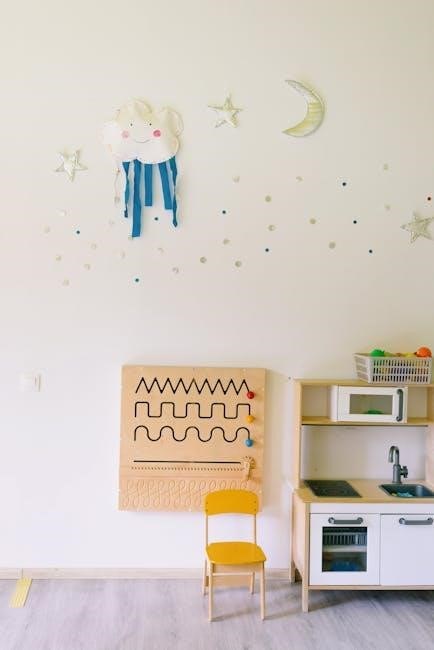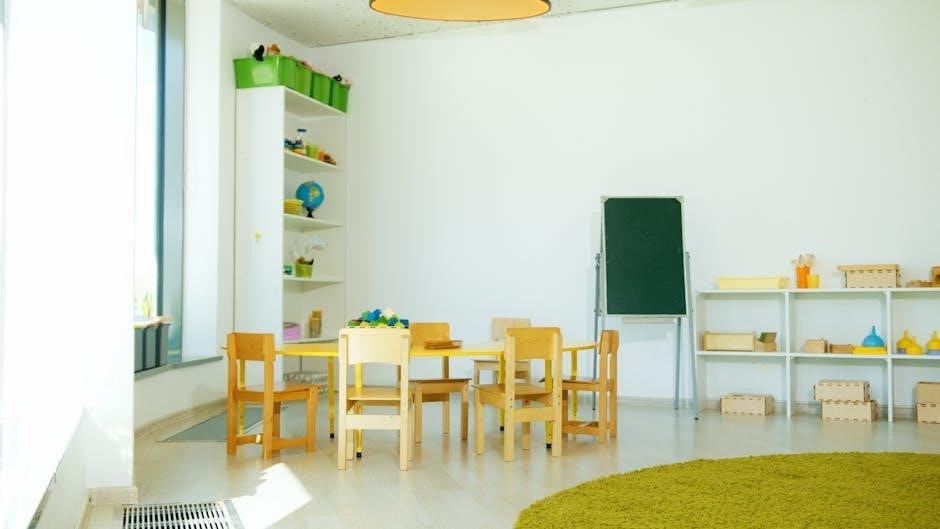The Early Years Foundation Stage (EYFS) is a framework for children’s education from birth to five, emphasizing seven key areas of learning and development. It guides childcare in nurseries, schools, and homes, fostering essential skills through play and exploration.
Purpose of the EYFS
The purpose of the Early Years Foundation Stage (EYFS) is to ensure all children receive a balanced and enriching education from birth to five years old. It provides a framework for learning and development, preparing children for school and future life. The EYFS focuses on fostering social, emotional, physical, and cognitive growth through play and structured activities. It ensures quality education, promoting equality and inclusion for all children, regardless of background or ability. By setting clear standards, the EYFS helps practitioners create engaging environments that support individual needs and interests. This foundation stage is crucial for building confidence, curiosity, and essential skills, laying the groundwork for lifelong learning and success.
Importance of the 7 Areas of Learning
The 7 areas of learning in the EYFS are crucial for children’s holistic development, providing a balanced foundation for future academic and personal success. They ensure children develop essential skills across emotional, social, physical, and cognitive domains. These areas interlink, fostering a well-rounded approach to learning. For instance, communication and language underpin all other areas, while literacy and mathematics build foundational academic skills. Personal, social, and emotional development nurtures resilience and confidence, while physical development enhances coordination and health awareness. Understanding the world and expressive arts encourage curiosity and creativity. Together, these areas prepare children for lifelong learning, equipping them with the skills and confidence to thrive in school and beyond.

Prime Areas of Learning
The prime areas—Personal, Social, and Emotional Development; Physical Development; and Communication and Language—lay the foundation for children’s skills, fostering confidence, coordination, and effective communication;

Personal, Social, and Emotional Development
Personal, Social, and Emotional Development (PSED) is a prime area of the EYFS, focusing on children’s emotional well-being, social skills, and self-awareness. It helps children develop confidence, self-regulation, and positive relationships with others. This area is crucial as it lays the foundation for children to manage their emotions, cooperate with peers, and develop resilience. Activities such as sharing, turn-taking, and group play are often used to foster these skills. PSED also encourages children to express their feelings and understand others’, promoting empathy and kindness. By nurturing these abilities, the EYFS supports children in becoming confident, independent, and socially aware individuals. This area is deeply interconnected with other aspects of learning, ensuring a holistic approach to early childhood development.

Physical Development
Physical Development in the EYFS focuses on children’s ability to control their bodies, coordinate movements, and handle tools and equipment. It encompasses both gross motor skills, such as running, jumping, and balancing, and fine motor skills, like using pencils or utensils. This area also promotes an understanding of health and well-being, encouraging children to make healthy choices. Physical activities are designed to enhance strength, agility, and dexterity, while fostering a sense of confidence and independence. By engaging in play and structured exercises, children develop the physical abilities necessary for everyday tasks and lifelong learning. This foundation supports their overall development and readiness for future challenges.
Communication and Language
Communication and Language is one of the prime areas of the EYFS, focusing on children’s ability to express thoughts, listen, and understand others. It includes spoken language development, active listening, and vocabulary expansion. This area encourages children to engage in conversations, describe experiences, and use language to solve problems. Practitioners support this by creating opportunities for talk, sharing stories, and modeling effective communication. Parents and caregivers play a vital role by engaging in meaningful interactions, fostering a love for language, and providing feedback. Strong communication skills lay the foundation for literacy and future academic success, making this area essential for holistic development. Activities like role-play, storytelling, and group discussions are often used to enhance these skills in a playful and engaging manner.
Specific Areas of Learning
The Specific Areas of Learning include Literacy, Mathematics, Understanding the World, and Expressive Arts and Design. These areas build on the Prime Areas, fostering essential skills and knowledge for future education.
Literacy
Literacy is one of the seven areas of learning in the EYFS, focusing on developing essential reading, writing, and communication skills. It encourages children to explore and understand the relationship between sounds and letters, laying the foundation for fluent reading and confident writing. Through engaging activities like storytelling, rhyming games, and wordplay, children develop phonological awareness and comprehension. Literacy also involves fostering a love for books and an understanding of how texts convey meaning. As children progress, they learn to write their names, form letters, and create simple sentences, building a strong base for future academic success. This area is deeply interconnected with Communication and Language, ensuring children can express their thoughts and ideas effectively.
Mathematics
Mathematics in the EYFS focuses on developing children’s understanding of numbers, shapes, and problem-solving skills through play and practical experiences. It encourages curiosity and confidence in using math to solve real-life problems. Activities like counting, sorting, and comparing objects help build foundational numeracy skills. Shape recognition and basic addition/subtraction concepts are introduced, fostering logical thinking. The emphasis is on making math fun and accessible, preparing children for future academic success. By exploring patterns, measuring, and using everyday materials, children develop a strong mathematical foundation. This area supports critical thinking and creativity, essential for lifelong learning and problem-solving abilities.
Understanding the World
Understanding the World is one of the specific areas of learning in the EYFS, focusing on helping children make sense of their environment, community, and the wider world. It encourages curiosity, exploration, and a sense of wonder. This area includes exploring nature, understanding technology, and learning about different cultures and traditions. Children are supported in developing an awareness of the world around them, fostering respect for diversity and promoting a sense of belonging. Activities often involve hands-on experiences, such as observing plants, using tools, and engaging with stories from different cultures. This area also lays the foundation for future learning in science, history, and geography, while nurturing critical thinking and problem-solving skills. By exploring and investigating, children build a deeper understanding of the world and their place within it.
Expressive Arts and Design
Expressive Arts and Design is one of the specific areas of learning in the EYFS, focusing on fostering creativity and imagination in children. It encourages exploration and engagement with various art forms, such as painting, drawing, music, and role-playing. This area helps children develop their critical thinking and problem-solving skills through creative expression. Activities like designing, making, and evaluating art and crafts enable children to communicate their ideas and emotions effectively. The emphasis is on the process rather than the final product, allowing children to experiment and learn without fear of failure. By integrating music, dance, and drama, Expressive Arts and Design supports children in developing confidence and self-expression, laying a foundation for lifelong appreciation of the arts.

Key Concepts and Skills Across All Areas
Playing and Exploring, Active Learning, and Creating and Thinking Critically are essential concepts that foster skills development across the seven areas of learning in EYFS.
Playing and Exploring

Playing and Exploring is a fundamental concept within the EYFS, encouraging children to engage with their environment, explore materials, and develop their imagination. This approach fosters creativity and critical thinking, allowing children to discover and learn at their own pace. By exploring different activities and resources, children build confidence and curiosity, which are essential for their overall development. Playing and Exploring also supports the development of problem-solving skills, as children learn to investigate and understand the world around them. This concept is closely linked to the seven areas of learning, particularly Literacy, Mathematics, and Understanding the World, as it provides a foundation for future academic success. Through playful exploration, children develop a love for learning that lasts a lifetime.
Active Learning
Active Learning is a cornerstone of the Early Years Foundation Stage (EYFS), fostering children’s engagement and motivation in their educational journey. It encourages children to explore, investigate, and learn through hands-on experiences, developing critical thinking and problem-solving skills. This approach emphasizes the importance of children being actively involved in their learning processes, whether through play, structured activities, or real-life scenarios. Active Learning promotes resilience, curiosity, and creativity, enabling children to take ownership of their learning and build confidence. By integrating Active Learning into daily routines, educators and caregivers support children in developing a lifelong love for learning and equipping them with essential skills for future success.
Creating and Thinking Critically
Creating and Thinking Critically is one of the key concepts in the EYFS, fostering children’s ability to explore ideas, make connections, and solve problems. This area encourages creativity, imagination, and innovation, helping children develop original ideas and think independently. Educators provide opportunities for children to engage in open-ended activities, such as art, design, and imaginative play, allowing them to express their thoughts and ideas freely. Critical thinking is nurtured through questioning, reflection, and problem-solving, enabling children to evaluate information and make informed decisions. By fostering these skills, the EYFS prepares children to approach challenges with confidence and resilience, laying a strong foundation for lifelong learning and creativity.
Implementation and Assessment

Effective implementation involves tailored strategies, observing children’s progress, and using feedback to adapt teaching methods. Assessment in EYFS ensures individual needs are met and tracks developmental milestones accurately.
Strategies for Effective Learning

Effective learning strategies in the EYFS focus on fostering curiosity, creativity, and independence. Play-based approaches encourage children to explore and discover concepts at their own pace. Active learning involves hands-on experiences, enabling children to engage deeply with their environment. Creating and thinking critically are emphasized, allowing children to develop problem-solving skills. Adults support learning by providing open-ended resources, such as art materials and imaginative play props, which stimulate creativity. Positive interactions and meaningful conversations help build language skills and confidence. Observations and feedback guide children’s progress, ensuring they are challenged and supported appropriately. These strategies create a nurturing environment where children can thrive across all seven areas of learning and development.
Role of Assessment in EYFS
Assessment in the Early Years Foundation Stage (EYFS) plays a crucial role in understanding children’s progress across the 7 areas of learning. It is an ongoing process that involves observing children during their daily activities and tracking their development. This helps practitioners identify each child’s strengths, needs, and learning styles, ensuring personalized support. Assessment also informs future planning, enabling educators to set meaningful milestones and adapt teaching strategies. By monitoring progress, the EYFS framework ensures that children receive the right support to thrive. Regular feedback and collaboration with parents further enhance the assessment process, creating a consistent approach to development both at home and in the setting. This holistic approach supports overall growth and prepares children for future success.

The Role of Parents and Caregivers
Parents and caregivers play a vital role in supporting children’s development at home, complementing the EYFS framework by fostering skills and confidence through daily interactions and activities.
Involvement in Learning
Parental involvement in a child’s learning journey is vital for their development. By engaging in activities that align with the 7 areas of learning, parents can support their child’s growth. Sharing books, discussing progress with educators, and encouraging curiosity at home fosters a love for learning. Parents are their child’s first educators, and their active participation creates a strong foundation. Regular communication with teachers ensures consistency between home and school. Simple practices, like talking about daily experiences or exploring interests together, can significantly enhance a child’s skills. This collaborative approach helps children feel secure and motivated, laying the groundwork for future success. Parents’ involvement not only strengthens their bond with their child but also reinforces the learning experiences provided by the EYFS framework.

Supporting Development at Home
Parents and caregivers play a vital role in supporting their child’s development across the 7 areas of learning. By creating a nurturing environment, they can encourage curiosity and independence. Simple activities like reading, singing, and exploring nature align with the EYFS framework, fostering literacy, communication, and understanding the world. Providing opportunities for physical play, such as dancing or outdoor games, promotes physical development. Engaging in conversations and praising efforts helps build confidence and emotional resilience. Parents can also support mathematical skills through everyday tasks, like counting or measuring. Collaborating with educators ensures consistency between home and school, reinforcing learning and development. By being involved, parents contribute significantly to their child’s holistic growth during the early years.

